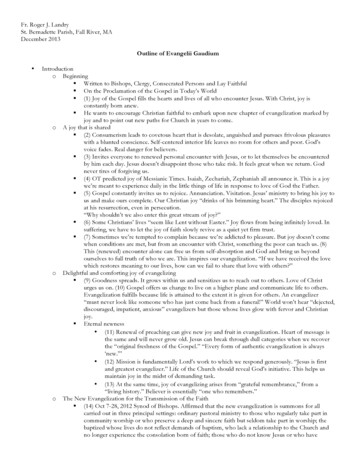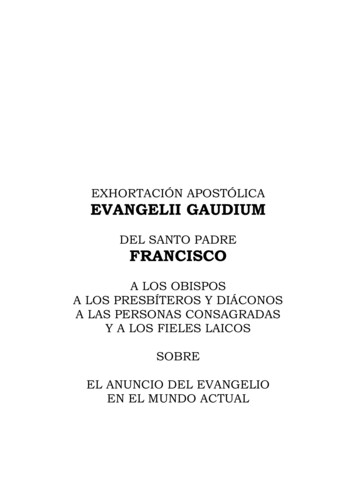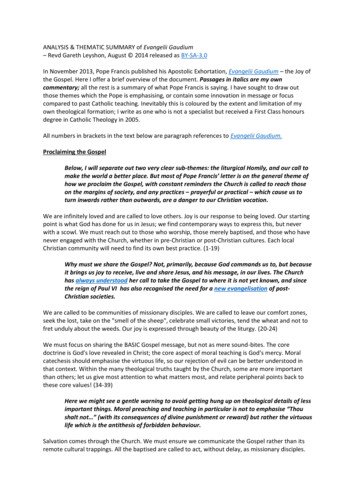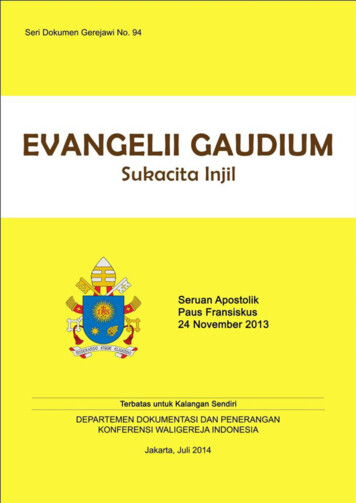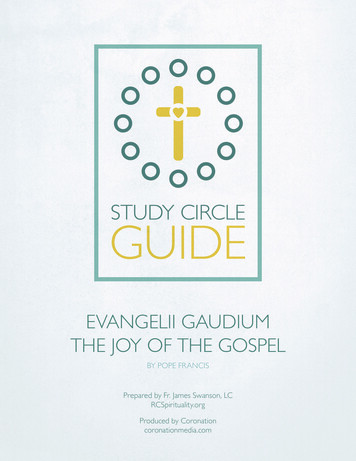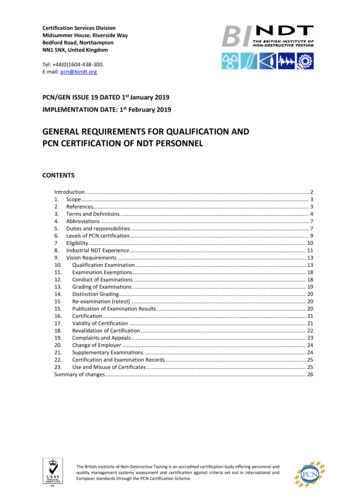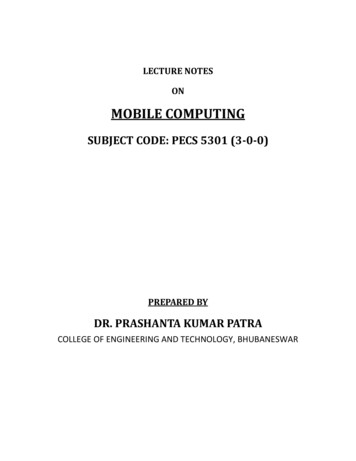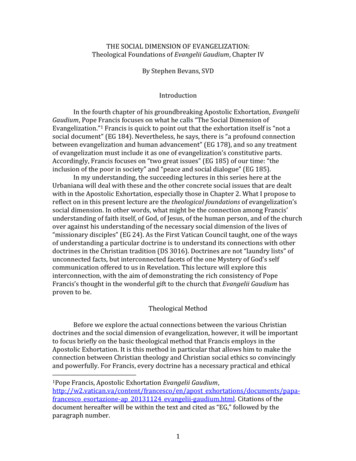
Transcription
THE SOCIAL DIMENSION OF EVANGELIZATION:Theological Foundations of Evangelii Gaudium, Chapter IVBy Stephen Bevans, SVDIntroductionIn the fourth chapter of his groundbreaking Apostolic Exhortation, EvangeliiGaudium, Pope Francis focuses on what he calls “The Social Dimension ofEvangelization.”1 Francis is quick to point out that the exhortation itself is “not asocial document” (EG 184). Nevertheless, he says, there is “a profound connectionbetween evangelization and human advancement” (EG 178), and so any treatmentof evangelization must include it as one of evangelization’s constitutive parts.Accordingly, Francis focuses on “two great issues” (EG 185) of our time: “theinclusion of the poor in society” and “peace and social dialogue” (EG 185).In my understanding, the succeeding lectures in this series here at theUrbaniana will deal with these and the other concrete social issues that are dealtwith in the Apostolic Exhortation, especially those in Chapter 2. What I propose toreflect on in this present lecture are the theological foundations of evangelization’ssocial dimension. In other words, what might be the connection among Francis’understanding of faith itself, of God, of Jesus, of the human person, and of the churchover against his understanding of the necessary social dimension of the lives of“missionary disciples” (EG 24). As the First Vatican Council taught, one of the waysof understanding a particular doctrine is to understand its connections with otherdoctrines in the Christian tradition (DS 3016). Doctrines are not “laundry lists” ofunconnected facts, but interconnected facets of the one Mystery of God’s selfcommunication offered to us in Revelation. This lecture will explore thisinterconnection, with the aim of demonstrating the rich consistency of PopeFrancis’s thought in the wonderful gift to the church that Evangelii Gaudium hasproven to be.Theological MethodBefore we explore the actual connections between the various Christiandoctrines and the social dimension of evangelization, however, it will be importantto focus briefly on the basic theological method that Francis employs in theApostolic Exhortation. It is this method in particular that allows him to make theconnection between Christian theology and Christian social ethics so convincinglyand powerfully. For Francis, every doctrine has a necessary practical and ethical1PopeFrancis, Apostolic Exhortation Evangelii apost exhortations/documents/papafrancesco esortazione-ap 20131124 evangelii-gaudium.html. Citations of thedocument hereafter will be within the text and cited as “EG,” followed by theparagraph number.1
connection. This is demanded by the very nature of faith itself, and the doctrinesthat express that faith.Francis’ method in Evangelii Gaudium is the same method employed in theLatin American Bishop’s Fifth General Assembly at Aparecida, Brazil, the finaldocument of which he had a major part as chair of the drafting committee. This isthe method of “See, Judge, Act,” the method employed by the Latin AmericanBishops in their second and third assemblies in Medellin, Colombia in 1968 andPuebla, Mexico in 1979. This method was sidestepped in the bishops’ 1992assembly in Santo Domingo, Dominican Republic in 1992, but reprised again atAparecida.2 As commentator José Marins has observed, the document of Aparecidarepresents a “return to inductive theology.”3What this means is that Francis is concerned in the Apostolic Exhortation toroot his teaching on evangelization in the specific context of the world today. InChapter 2, therefore, Francis sketches out several areas of concrete concern inwhich evangelization is to be carried out, and these are, by and large, social issues.As he writes in what could be a summary, themajority of our contemporaries are barely living from day to day, with direconsequences. The hearts of many people are gripped by fear anddesperation, even in the so-called rich countries. The joy of living frequentlyfades, lack of respect for others and violence are on the rise, and inequality isincreasingly evident. It is a struggle to live and, often, to live with preciouslittle dignity. This epochal change has been set in motion by the enormousqualitative, quantitative, rapid, and cumulative advances occurring in thesciences and in technology, and by their instant application in different areasof nature and life. We are in an age of knowledge and information, which hasled to new and often anonymous kinds of power (EG 52).Francis goes on in subsequent paragraphs to speak about the failure of“trickle-down economics” (EG 54), of how “the culture of prosperity deadens us”(EG 54), of inequality among peoples (EG 59), of consumerism (EG 60), of attacks onreligious freedom (EG 61), and of the pervasiveness in some places of secularismand individualism (EG 64). Francis says much more in Chapter 2, but my point hereis only to observe that Francis’ theological concern is social through and through.His understanding of faith, of God, of Jesus, of women and men, and of the church isall conditioned by his concern to address this social context with the riches of theChristian tradition. I hope to show this in the following sections.The Nature of FaithEpiscopal Conferences of Latin America, Aparecida Final Document ncluding%20Document.pdf, 19.3 See José Marins, “Base Communities: A Return to Inductive Methodology,” in ed.Robert S. Pelton, Aparecida: Quo Vadis? (Chicago: University of Chicago Press, 2009),93-99.22
For Francis, Christian faith is a faith that does justice. The content orintellectual dimension of faith (credere Deum) is certainly important, but a slavishrepetition of orthodox phrases is much less so (see EG 41). The affective dimension(credere Deo) is also clearly stressed, as Francis calls women and men to a deep,personal relation with Christ (see, for example, EG 3, 7). But time and again Francisspeaks of the moral or transformative aspect of faith (credere in Deum), that aspectof faith that changes Christians’ behavior and propels them to the service of the poorand of justice.This is true from the very beginning of a life of faith: “Accepting the firstproclamation, which invites us to receive God’s love and to love him in return withthe very love which is his gift, brings forth in our lives and actions a primary andfundamental response: to desire, seek, and protect the good of others” (EG 178).Quoting John Paul II’s Ecclesia in America, he writes that “Christian conversiondemands reviewing especially those areas and aspects of life ‘related to the socialorder and the pursuit of the common good’” (EG 182).4 In the introductoryparagraphs of Chapter 4 on the Social Dimension of Evangelization, Francis speaksof this dynamic aspect of faith, that “always involves a deep desire to change theworld, to transmit values, to leave this earth somehow better than we found it” (EG183).Specifically Christian faith leads to this kind of commitment: “True faith inthe Son of God is inseparable from self-giving, from membership in the community,from service, from reconciliation with others” (EG 88). Francis says it very plainly:“We have to state, without mincing words, that there is an inseparable bondbetween our faith and the poor. May we never abandon them” (EG 48). One cannothave faith without social commitment. Living in a world of poverty, oppression, andexclusion will not allow it. The behavioral nature of faith is seen even more clearlyin the way that Francis writes of the various concrete doctrines of faith, to which Inow turn.The Doctrines of God and ChristologyThe tender, merciful, loving God whom Francis describes so often and sobeautifully in the Apostolic Exhortation (for example, EG 3, 11, 37, 274) is also theGod whose “heart has a special place for the poor, so much so that he himself‘became poor’ (2Cor 8:9)” (EG 197). The God of Christian Revelation is a God “whocalls for a committed response which is outside of the categories of themarketplace,” who “calls human beings to their full realization and to freedom fromall forms of enslavement” (57).God’s work of redemption involves a social dimension because “’God, inChrist, redeems not only the individual person, but also the social relations existingbetween men’” (EG 178). Some Christians, the pope says, only want a “spiritualJohn Paul II, Apostolic Exhortation Ecclesia in America, quoting JP II, Ecclesia inAmerica,http://www.vatican.va/holy father/john paul ii/apost exhortations/documents/hfjp-ii exh 22011999 ecclesia-in-america en.html, 27.43
Christ, without flesh and without the cross,” but the Gospel calls us to run the risk ofencounters, and challenges us to face others’ “pain and their pleas, with their joywhich infects us in our close and continuous action.” To believe in Christ is to besummoned to “the revolution of tenderness” (EG 88).“Jesus’ sacrifice on the cross is nothing else than the culmination of the wayhe lived his entire life.” If we accept Christ, we will be “moved by his example,” andwill want to enter fully into the fabric of society, sharing the lives of all, listening totheir concerns, helping them materially and spiritually in their needs, rejoicing withthose who rejoice, weeping with those who weep; arm in arm with others, we arecommitted to building a new world” (EG 269). If we believe in Jesus we will notkeep “the Lord’s wounds at arm’s length,” but, as Jesus wants and hopes, we willopen up to human misery and “touch the suffering flesh of others.” And when we doso, “our lives become wonderfully complicated and we experience intensely what itis to be a people, to be part of a people” (EG 270).Christian AnthropologyWhile Francis only hints at the social implications of the doctrines of God andChrist, the doctrine which perhaps most clearly implies the social dimension of thegospel is that of Christian Anthropology. But the connection among the doctrines isclear. Quoting form an Angelus discourse of John Paul II, for example, Francis writesthat “To believe in a Father who loves all men and women with an infinite lovemeans realizing that ‘he thereby confers upon them an infinite dignity’” (EG 178).5Francis waxes eloquently on the dignity of the human person, given as God’s gift increation. He insists that “every person is worthy of our giving. Not for their physicalappearance, their abilities, their language, their way of thinking, or for anysatisfaction that we might receive, but rather because they are God’s handiwork, hiscreation.” Indeed, “every human being is the object of God’s infinite tenderness, andhe himself is present in their lives.” And so “appearances notwithstanding, everyperson is immensely holy and deserves our love.” (EG 274). This is why human beingscan never be forgotten or overlooked, and why Francis condemns those things incontemporary culture and economic life that sees human beings as disposable unitsin a “throw away” culture. Human beings cannot they cannot be “consumer goods tobe used and then discarded” (EG 53).In one passage, Francis is speaking of the sanctity of unborn life and insiststhat “human beings are ends in themselves and never a means of resolving otherproblems. Once this conviction disappears, so do solid and lasting foundations forthe defense of human rights, which would always be at the whims of the powers thatbe” (EG 213). Such a conviction conveys a truth beyond the Right to Life debate. Thenature of the human person demands that evangelization include a socialdimension.John Paul II, Message to the Handicapped, Angelus, Nov 16, 1980) Insegnamenti3/2 (1980), 1232.54
In a theme that is often repeated at various parts of the ApostolicExhortation, Francis writes of the human person as essentially ordered to others. Amajor part of the message of evangelization, then, is that human beings are called bytheir very nature to service, and especially to service of the poor and marginalizedof the world. It is precisely in going out of oneself, in other words, that one actuallydiscovers the wholeness that is Christian salvation.Early on in Evangelii Nuntiandi, Francis states this succinctly. “We becomefully human when we become more than human, when we let God bring us beyondourselves in order to attain the fullest truth of our being” (EG 8). In paragraph 10,Francis quotes from the Latin American bishops’ Aparecida Document: “Life growsby being given away, and it weakens in isolation and comfort. Indeed, those whoenjoy life most are those who leave security on the shore and become excited by themission of communicating life to others.” He goes on to say that “here we find aprofound law of reality: that life is attained and matures in the measure that it isoffered up in order to give life to others” (EG 10).6 In some of the final paragraphs ofthe document, Francis comes back to this theme again: “We do not live better whenwe flee, hide, refuse to share, stop giving, and lock ourselves up in our own comforts.Such a life is nothing less than slow suicide” (EG 272). Francis speaks about an“anthropocentric immanentism” (EG 94) that focuses only on oneself and not onChrist and others. This false turning in on ourselves results in indulging “in endlessfantasies” and losing “contact with the real lives and difficulties of our people” (EG96). We counter this tendency “by making the Church constantly go out fromherself, keeping her mission focused on Jesus Christ, and her commitment to thepoor” (EG 97).A Christian anthropology moves toward an understanding of the church as acommunity that “goes forth” as a “community of missionary disciples” (EG 24). It isto ecclesiology, then, that we now turn.EcclesiologyEchoing Vatican II’s missionary decree,7 Evangelii Gaudium states that “Byher very nature the Church is missionary; she abounds in effective charity and acompassion which understands, assists, and promotes” (EG 179). The church is notsimp
As he writes in what could be a summary, the majority of our contemporaries are barely living from day to day, with dire consequences. The hearts of many people are gripped by fear and desperation, even in the so-called rich countries. The joy of living frequently fades, lack of respect for others and violence are on the rise, and inequality is
